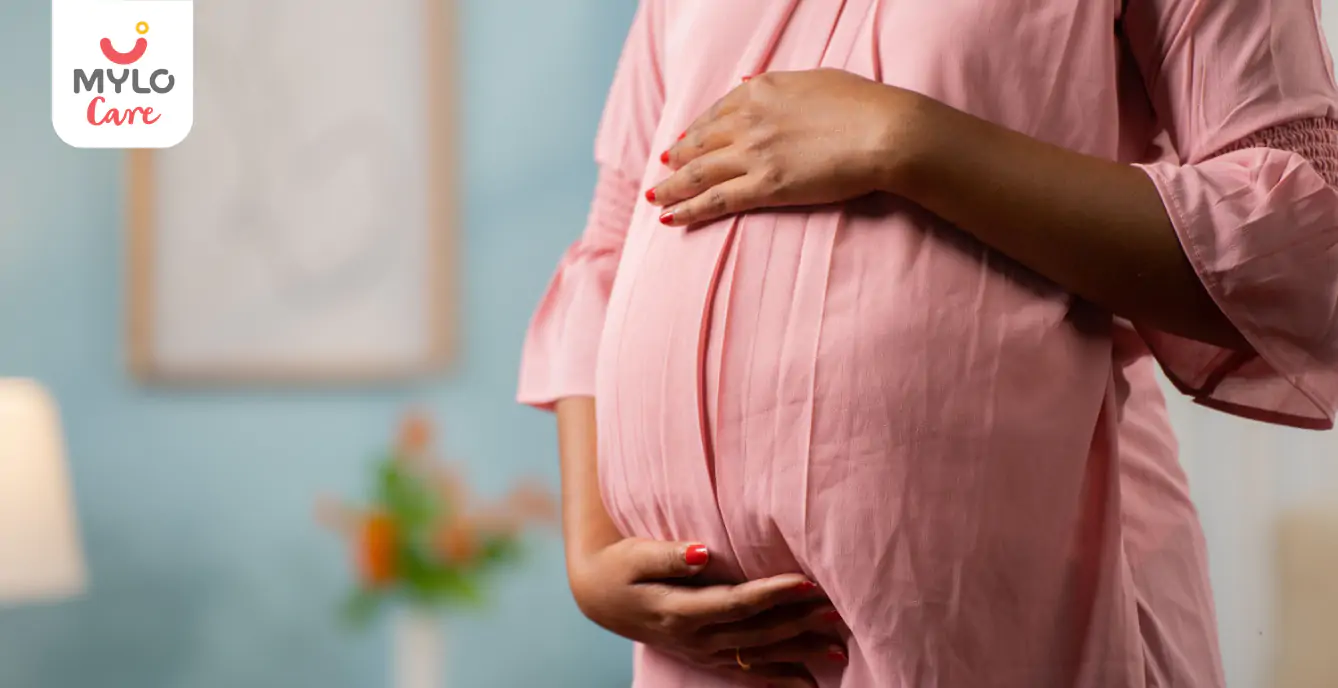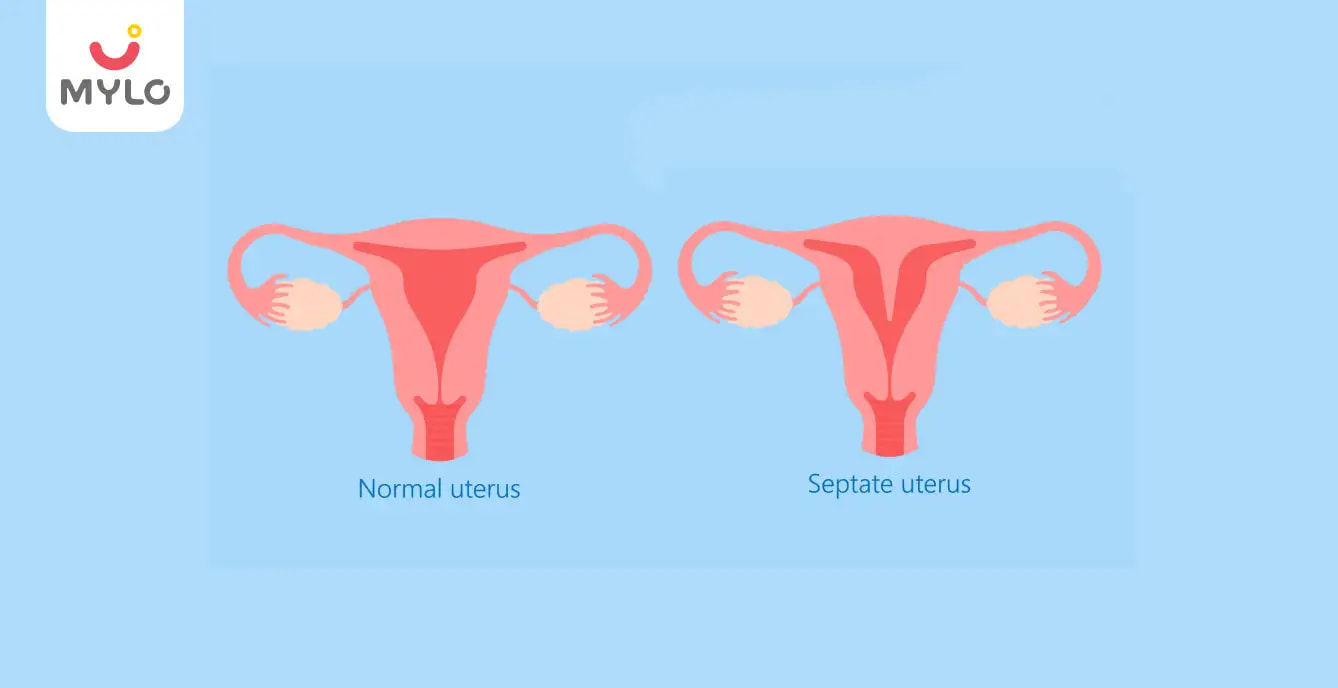- Home

- Women Specific Issues

- Septate Uterus: A Comprehensive Guide on Symptoms, Risks, and Treatment Options
In this Article
Women Specific Issues
Septate Uterus: A Comprehensive Guide on Symptoms, Risks, and Treatment Options
Updated on 3 January 2024



Medically Reviewed by
Dr. Shruti Tanwar
C-section & gynae problems - MBBS| MS (OBS & Gynae)
View Profile

In the world of women's health, there are countless conditions that can impact fertility and reproductive well-being. One such condition is the septate uterus, a condition that affects the shape and structure of the uterus. While it might sound intimidating, understanding the symptoms, risks, and treatment options is crucial for those who may be dealing with this condition or seeking to expand their knowledge.
Septate Uterus Meaning
Septate uterus means the uterus is divided by a wall known as a septum. This wall can either partially or completely separate the uterus into two distinct cavities. The septum is formed during fetal development and is caused by the incomplete resorption of the tissue that divides the uterus in early stages. This condition is estimated to affect about 1% of women.
Symptoms of Septate Uterus
In most cases, women with a septate uterus do not experience any symptoms. However, some women may experience recurrent miscarriages or infertility issues. Additionally, there may be an increased risk of preterm labor and malpresentation of the fetus during pregnancy. It is important to note that these symptoms are not exclusive to a septate uterus and can be caused by other factors as well.
Bicornuate Uterus vs Septate Uterus
It is crucial to understand the difference between septate and bicornuate uterus, as they are often confused due to their similar appearance. While both conditions involve a division of the uterus, a bicornuate uterus has two distinct uterine horns, whereas a septate uterus has a single, divided cavity.
Bicornuate uterus may also sometimes result in two cervices whereas septate uterus always has only one cervix.
You may also like : Bicornuate Uterus: A Comprehensive Guide on Causes, Symptoms and Treatment Options
Is it Possible to Have a Successful Pregnancy with Septate Uterus?
The ability to have a successful pregnancy with a septate uterus largely depends on the extent of the septum and its impact on the uterine cavity. In cases where the septum is small and does not significantly affect the implantation of the embryo, women can have successful pregnancies without any complications.
However, for those with a larger septum, the risk of miscarriage and other pregnancy complications increases. It is essential to consult with a healthcare provider to assess the individual situation and determine the best course of action.
You may also like: Bulky Uterus: What You Need to Know About this Common Gynecological Issue
What are the Risks of a Septate Uterus Pregnancy?
Let us now understand the risks that a pregnancy with such a condition carries:
1. Miscarriage
Women with a septate uterus have a higher risk of experiencing recurrent miscarriages compared to those with a normal uterus. The presence of the septum can interfere with the implantation of the embryo or lead to insufficient blood supply, resulting in pregnancy loss.
2. Preterm Labor
The presence of a septate uterus increases the risk of preterm labor. The septum can cause the uterus to stretch unevenly, leading to premature contractions and potentially early delivery.
3. Malpresentation of the Fetus
A septate uterus can also increase the likelihood of the fetus being in a breech or transverse position. The presence of the septum restricts fetal movement, making it difficult for the baby to assume the optimal head-down position for delivery.
4. Placental Abruption
Placental abruption, where the placenta separates from the uterine wall prematurely, is more common in women with a septate uterus. The presence of the septum can disrupt the blood supply to the placenta, increasing the risk of this serious complication.
5. Infertility
While not directly related to pregnancy, a septate uterus can also be associated with infertility. The presence of the septum can affect the implantation of the embryo or interfere with the fallopian tubes' function, making it more challenging to conceive.
How is Septate Uterus Diagnosed?
Septate uterus can be diagnosed through various imaging techniques, with ultrasound being the most common. During a septate uterus ultrasound, a transvaginal probe is used to visualize the uterus and identify the presence of a septum.
Other imaging techniques, such as magnetic resonance imaging (MRI) or hysterosalpingography, may be employed for a more detailed evaluation. It is important to consult with a healthcare provider experienced in reproductive medicine to ensure an accurate diagnosis.
Septate Uterus Treatment Options
There are a few treatment options available for this condition such as:
1. Hysteroscopic Septum Resection
Hysteroscopic septum resection is the most common and effective treatment for a septate uterus. It is a minimally invasive procedure performed under general anesthesia. A hysteroscope, a thin, lighted tube, is inserted through the cervix to visualize and remove the septum using specialized surgical instruments. This procedure has a high success rate and allows for a relatively quick recovery.
2. Laparoscopically Guided Hysteroscopic Resection
This procedure involves using laparoscopy to guide the hysteroscope, a thin instrument with a camera, into the uterus. The surgeon can then visualize and remove the fibrous septum dividing the uterine cavity, restoring its normal shape. This minimally invasive approach offers several advantages, including shorter recovery time, reduced postoperative pain, and minimal scarring.
3. Expectant Management
In cases where the septum is small and does not significantly impact fertility or pregnancy outcomes, expectant management may be an option. This approach involves monitoring the woman's reproductive health closely and addressing any complications as they arise. It is important to note that expectant management may not be suitable for everyone and should be discussed with a healthcare provider.
You may also like : Uterus Didelphys: Understanding Symptoms, Risks and Treatment Options
Key Takeaways
Women with a septate uterus may experience symptoms such as recurrent miscarriages, infertility, preterm labor, malpresentation of the fetus, and placental abruption. Treatment options include hysteroscopic or laparoscopically guided septum resection, or expectant management in cases of a small septum. It is important to consult with a healthcare provider to determine the best course of action based on individual circumstances.
References
1. Rousseau L, Brichant G, Timmermans M, Nisolle M, Tebache L. (2021). Daily practice management of septate uterus: reproductive outcome after septoplasty. Facts Views Vis Obgyn.
2. Selvaraj P, Selvaraj K. (2010). Reproductive outcome of septate uterus following hysteroscopic septum resection. J Hum Reprod Sci.





Medically Reviewed by
Dr. Shruti Tanwar
C-section & gynae problems - MBBS| MS (OBS & Gynae)
View Profile


Written by
Anandita Sharma
Drawing on more than a decade of expertise in administration, Anandita Sharma currently serves as a content operations e
Read MoreGet baby's diet chart, and growth tips

Related Articles
How Respiratory Syncytial Virus (RSV) Impacts Premature Babies Differently: What Every Parent Needs To Know
Adverbs: A Comprehensive Guide to help small children learn the usage of adverbs
Expand Your Child's Vocabulary with words that start with X: Easy, Positive, and Engaging Words, Animals, Countries, and Fruits
Unlocking Language Proficiency: The Ultimate Guide to Top 100 Sight Words for Kindergarten and Beyond
Related Questions
Influenza and boostrix injection kisiko laga hai kya 8 month pregnancy me and q lagta hai ye plz reply me

Hai.... My last period was in feb 24. I tested in 40 th day morning 3:30 .. That is faint line .. I conculed mylo thz app also.... And I asked tha dr wait for 3 to 5 days ... Im also waiting ... Then I test today 4:15 test is sooooo faint ... And I feel in ma body no pregnancy symptoms. What can I do .

Baby kicks KB Marta hai Plz tell mi

PCOD kya hota hai

How to detect pcos

Related Topics
RECENTLY PUBLISHED ARTICLES
our most recent articles

Vaccinations
Should Pregnant Women Get Flu Shots

Tips For Normal Delivery
Why you should choose a Vaginal Delivery? Know the pros & cons

Pregnancy Precautions
The Art of Painting When Pregnant: Tips for a Safe and Creative Experience

Do Pregnant Women Get Their Period?

Conception
A Guide to Precautions After Ovulation When Trying to Conceive

Tight Vagina and Women's Health: An In-Depth Guide
- The Ultimate Guide to Using Olive Oil for Baby Massage
- Heat Rash During Pregnancy: Causes, Symptoms and Prevention
- The Ultimate Guide to Understanding the Reasons for Late Period
- What Can Be the Maximum Delay in Periods If Not Pregnant?
- Black Period Blood: Is It Normal or a Cause for Concern?
- Lean PCOS: A Comprehensive Guide on Causes, Symptoms and Treatment
- PCOS Mood Swings: The Ultimate Guide to Causes and Strategies for Relief
- PCOS and Thyroid: Understanding the Complex Relationship and Finding Solutions
- Intermittent Fasting & PCOS: The Ultimate Guide to Benefits, Risks and Precautions
- Insulin Resistance & PCOS: A Comprehensive Guide to Causes and Management
- Your heart stops beating when your baby feels breathless! Here are 5 things to know about infant breathlessness.
- Newborn Crying: What It Means and How to Handle It?
- When Do Babies Make Eye Contact: Keeping an Eye on Important Milestones
- Is your baby getting breathless frequently? Five things you must know


AWARDS AND RECOGNITION
Mylo wins Forbes D2C Disruptor award
Mylo wins The Economic Times Promising Brands 2022
AS SEEN IN
















At Mylo, we help young parents raise happy and healthy families with our innovative new-age solutions:
- Mylo Care: Effective and science-backed personal care and wellness solutions for a joyful you.
- Mylo Baby: Science-backed, gentle and effective personal care & hygiene range for your little one.
- Mylo Community: Trusted and empathetic community of 10mn+ parents and experts.
Product Categories
baby carrier | baby soap | baby wipes | stretch marks cream | baby cream | baby shampoo | baby massage oil | baby hair oil | stretch marks oil | baby body wash | baby powder | baby lotion | diaper rash cream | newborn diapers | teether | baby kajal | baby diapers | cloth diapers |





